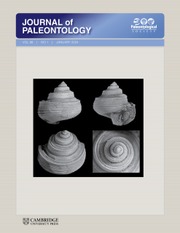Article contents
Parainoceramya n. gen. for Parainoceramus Cox, 1954 (ex Voronetz, 1936) partim (Bivalvia, Jurassic)
Published online by Cambridge University Press: 09 March 2015
Abstract
Several Jurassic pterioid bivalve species have been referred to Parainoceramus Cox by different authors, yet this has proved inadequate because the meaning of such genus has been compounded by nomenclatural and idiomatic problems, as well as misinterpretations. Hence, the new genus Parainoceramya is here proposed to accommodate several species previously referred to Parainoceramus, with Crenatula ventricosa J. de C. Sowerby as its type. Permian species originally assigned to Parainoceramus, including the type species, are referred to the genus Kolymia Likharev. All species attributed to Parainoceramus s.l. are reviewed and the new genus is compared with related genera. As here understood, the new genus is first recorded in the Hettangian and attained a cosmopolitan distribution; its last occurrence is probably Berriasian.
- Type
- Articles
- Information
- Copyright
- Copyright © 2015, The Paleontological Society
References
- 2
- Cited by


